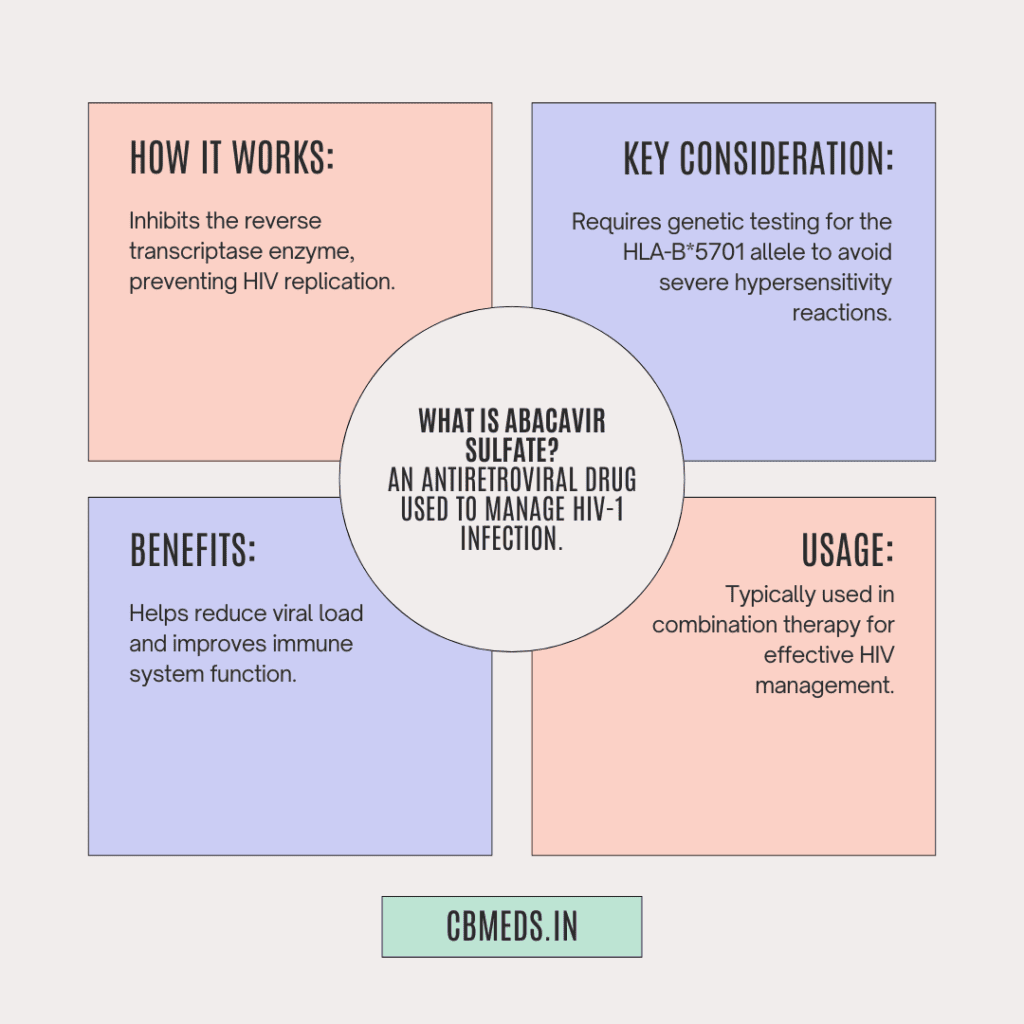
HIV (Human Immunodeficiency Virus) continues to pose significant global health challenges, but advancements in antiretroviral therapy have made managing the virus more effective than ever. Among the key medications in the arsenal against HIV is Abacavir Sulfate, a powerful drug that plays a crucial role in suppressing the virus and improving the lives of those living with HIV.
What is Abacavir Sulfate?
Abacavir Sulfate is an antiretroviral medication belonging to the class of drugs known as nucleoside reverse transcriptase inhibitors (NRTIs). It is typically used as part of combination therapy to treat HIV-1 infections. By targeting the reverse transcriptase enzyme, Abacavir Sulfate helps prevent the virus from replicating and spreading within the body.
How Does Abacavir Sulfate Work?
The reverse transcriptase enzyme is a critical component in the life cycle of HIV. It allows the virus to convert its RNA into DNA, which is then integrated into the host’s genetic material. Abacavir Sulfate inhibits this enzyme, effectively halting the replication process. This suppression helps reduce the viral load in the body, allowing the immune system to recover and function more effectively.
The Importance of Genetic Testing
While Abacavir Sulfate is a highly effective medication, it is not suitable for everyone. One of the most significant considerations before starting Abacavir is the risk of a hypersensitivity reaction. This reaction is linked to individuals who carry the HLA-B*5701 allele, a genetic marker associated with a higher likelihood of experiencing severe allergic responses to the drug.
Symptoms of hypersensitivity may include:
- Fever
- Rash
- Fatigue
- Gastrointestinal discomfort (nausea, vomiting, or diarrhea)
- Respiratory symptoms (shortness of breath or cough)
In rare cases, the reaction can be life-threatening if the medication is not discontinued promptly. To mitigate this risk, genetic testing for the HLA-B*5701 allele is strongly recommended before starting Abacavir Sulfate.
Benefits of Abacavir Sulfate
When used correctly, Abacavir Sulfate offers numerous benefits:
- Reduction in Viral Load: It effectively suppresses the replication of HIV, reducing the amount of virus in the bloodstream.
- Improved Immune Function: By lowering the viral load, the medication allows the immune system to recover and fight off infections more effectively.
- Part of a Comprehensive Treatment Plan: Abacavir Sulfate is typically combined with other antiretroviral drugs, enhancing its efficacy and reducing the likelihood of resistance.
- Convenient Dosage: It is available in fixed-dose combinations, simplifying treatment regimens and improving adherence.
Safety and Side Effects
Apart from hypersensitivity reactions, Abacavir Sulfate is generally well-tolerated. However, like all medications, it can have side effects, including:
- Mild nausea
- Headaches
- Fatigue
It is essential to report any unusual symptoms to a healthcare provider promptly to ensure safe and effective treatment.
Conclusion
Abacavir Sulfate remains a vital component in the fight against HIV. Its ability to suppress the virus and improve immune health makes it an invaluable tool in combination antiretroviral therapy. However, proper precautions, including genetic testing for the HLA-B*5701 allele, are crucial to ensure safety and maximize its benefits.
As we continue to make strides in HIV care, raising awareness about the proper use and safety considerations of medications like Abacavir Sulfate can help improve outcomes and empower individuals living with HIV. With the right treatment and support, managing HIV is no longer just a possibility—it’s a reality.
